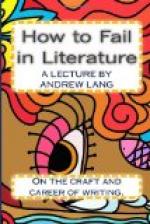Editors and publishers, these keepers of the gates of success, are not infallible, but their opinion of a beginner’s work is far more correct than his own can ever be. They should not depress him quite, but if they are long unanimous in holding him cheap, he is warned, and had better withdraw from the struggle. He is either incompetent, or he has the makings of a Browning. He is a genius born too soon. He may readily calculate the chances in favour of either alternative.
So much by way of not damping all neophytes equally: so much we may say about success before talking of the easy ways that lead to failure. And by success here is meant no glorious triumph; the laurels are not in our thoughts, nor the enormous opulence (about a fourth of a fortunate barrister’s gains) which falls in the lap of a Dickens or a Trollope. Faint and fleeting praise, a crown with as many prickles as roses, a modest hardly-gained competence, a good deal of envy, a great deal of gossip—these are the rewards of genius which constitute a modern literary success. Not to reach the moderate competence in literature is, for a professional man of letters of all work, something like failure. But in poetry to-day a man may succeed, as far as his art goes, and yet may be unread, and may publish at his own expense, or not publish at all. He pleases himself, and a very tiny audience: I do not call that failure. I regard failure as the goal of ignorance, incompetence, lack of common sense, conceited dulness, and certain practical blunders now to be explained and defined.
The most ambitious may accept, without distrust, the following advice as to How to fail in Literature. The advice is offered by a mere critic, and it is an axiom of the Arts that the critics “are the fellows who have failed,” or have not succeeded. The persons who really can paint, or play, or compose seldom tell us how it is done, still less do they review the performances of their contemporaries. That invidious task they leave to the unsuccessful novelists. The instruction, the advice are offered by the persons who cannot achieve performance. It is thus that all things work together in favour of failure, which, indeed, may well appear so easy that special instruction, however competent, is a luxury rather than a necessary. But when we look round on the vast multitude of writers who, to all seeming, deliberately aim at failure, who take every precaution in favour of failure that untutored inexperience can suggest, it becomes plain that education in ill-success, is really a popular want. In the following remarks some broad general principles, making disaster almost inevitable, will first be offered, and then special methods of failing in all special departments of letters will be ungrudgingly communicated. It is not enough to attain failure, we should deserve it. The writer, by way of insuring complete confidence, would modestly mention that he has had ample opportunities




